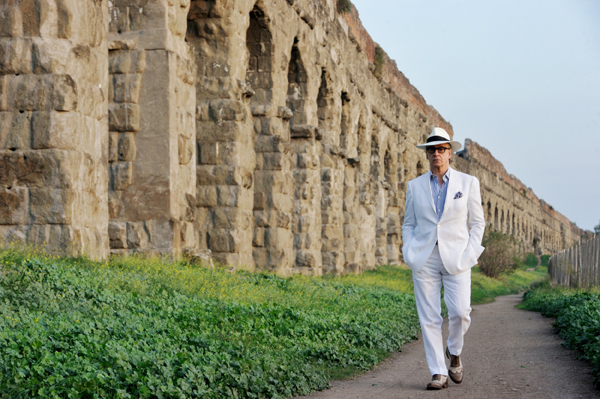A beguiling cinematic voyage that meanders through the emptiness of excess, Paolo Sorrentino’s The Great Beauty (La grande bellezza) is an exemplary effort in fanciful Fellini-esque filmmaking. Extravagant, whimsical, and overflowing with convivial chaos, the film follows Jep Gambardella (the marvelously absorbing Toni Servillo), a journalist and socialite, famed for the one and only novel he wrote more than 40 years ago. As he celebrates his 65th birthday with customarily outlandish festivities—including exotic dancers, lines of cocaine, and a mariachi band—Jep begins to reevaluate his surroundings, his companions, and, in particular, his purpose. He wanders through Rome, the city in which he has learned, lived, and loved for the majority of his life, and encounters a composite of decadence and desolation, all of which contribute to the film’s depiction of the great beauty of existence.
At the outset, Italian director Sorrentino (Il Divo, This Must Be the Place) establishes a sense of disjointed dichotomy, striving to emphasize the brilliance and pandemonium that persists in this depiction of the golden city. The film opens with cannonball fire at the Tomb of the Unknown Soldier, followed by a sequence of quick cuts between Roman citizens and monuments. The scene culminates with the heart attack of a Japanese tourist as he photographs the spectacular landscape while a choir of women chants in the background. This sets up the abiding theme concerning the fear of death and the loss of one’s legacy.
As the camera pans up and away from the crowd of concerned sightseers, the female chorus is jarringly interrupted by a blood-curdling scream, and the film abruptly reestablishes itself at Jep’s birthday party. This technique of contrasting juxtaposition is used to great effect; it forces the audience to remain alert and perceptive and prevents viewers from falling victim to the heedless mindset of imprudence, a characteristic attributed to many of Jep’s Roman companions.
The film lacks a sturdy narrative and instead favors more of a stream-of-consciousness style of plotting. Sorrentino and cinematographer Luca Bigazzi present us with a collection of stunning vistas and an incomparable palette of colors as Jep weaves his way through old friends, new lovers, saints, sinners, and everyone in between.
Jep offers condescending critiques to his fellow scholarly compatriots and then quickly contradicts himself by stating, “Things are too complicated to be understood by one individual.” He also casually discredits the luminosity and splendor of his country and its people while seated amidst breathtaking scenery and where everyone is lit, dressed, and made-up to look 15 years younger. The film is filled with many such contradictions.
Rather than waxing lyrical about the opulence and superficiality of today’s La Dolce Vita, Sorrentino simply shows us it by generating a fly-on-the-wall atmosphere, allowing audiences to soak up the beauty of Rome’s imperfections without ever feeling sermonized. That’s not to say that he fully refrains from throwing in a knowingly coy inducement every so often, but rather than patronizing, the ploy comes off as a tongue-in-cheek wink at what the director presumes to be a sharp-witted audience.
One such instance occurs when Jep states, “The best people in Rome are the tourists,” a biting barb against his decidedly affected, highbrow contemporaries. However, one cannot help but feel as though the remark was also meant to evoke a connection with viewers. As observers of the film and its affluent characters, we serve a fundamental purpose for these performers. Whether it’s a hollow performance artist smashing her face into an ancient column or a tantrum-laden girl hurling paint at a canvas and calling it a “masterpiece,” the film is stuffed with surface performances whose superficiality might only be only surpassed by the shallow onscreen spectators.
And yet it’s difficult not to be overtaken by the magnificence of the environment, despite the petulance and the sometimes repellent nature of the foreground players. In this way, The Great Beauty allows us all to be Roman tourists, and Jep finds his purpose by fulfilling his ultimate role, at least for now, as our tour guide.

















Leave A Comment